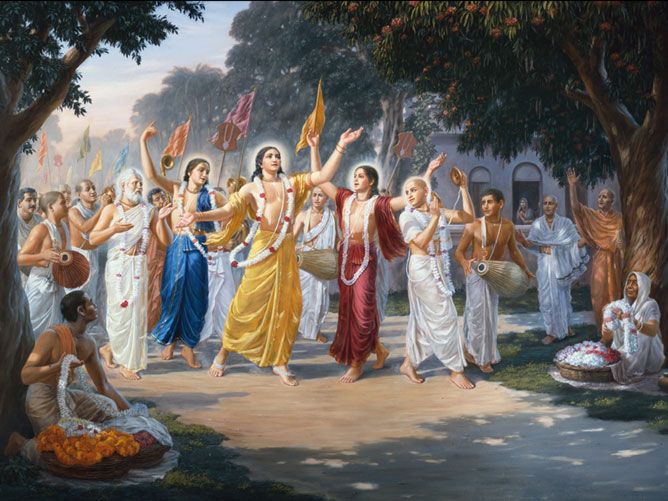Our Philosophy
The philosophy of the International Society for Krishna Consciousness (ISKCON) is rooted in the ancient teachings of the Vedas, particularly focusing on the path of bhakti-yoga or devotional service to Lord Krishna. ISKCON’s core philosophy is based on the belief that the ultimate goal of life is to develop a personal relationship with God through love and devotion. The movement follows the Gaudiya Vaishnavism tradition, which is a monotheistic branch of Hinduism.
Here are the key aspects of ISKCON’s philosophy:
1. Krishna as the Supreme Personality of Godhead
ISKCON teaches that Krishna is the Supreme Personality of Godhead, the source of all creation, and the ultimate object of devotion. While many forms of God are recognized within the Vedic tradition, Krishna is seen as the highest and most complete form of God, who embodies all qualities of the divine—beauty, wisdom, strength, and love.
Krishna is believed to reside in his eternal abode, Goloka Vrindavan, and through his divine pastimes, as described in texts like the Bhagavad Gita and Srimad Bhagavatam, he reveals his loving nature and invites devotees to establish a personal relationship with him.
2. Bhakti-yoga (Devotional Service)
Bhakti-yoga, or the yoga of devotion, is the primary spiritual practice in ISKCON. It involves dedicating one’s thoughts, actions, and life to serving Krishna with love and devotion. The practice of bhakti-yoga can be cultivated through various activities:
Chanting the Holy Names of Krishna: The central practice is the chanting of the Hare Krishna mantra:
- "Hare Krishna, Hare Krishna, Krishna Krishna, Hare Hare,
Hare Rama, Hare Rama, Rama Rama, Hare Hare"
Chanting is considered the most powerful way to purify the mind and soul in the present age (Kali-yuga) and to reawaken one’s dormant relationship with Krishna.
- "Hare Krishna, Hare Krishna, Krishna Krishna, Hare Hare,
Worship: ISKCON promotes Deity worship (puja) of Radha-Krishna in temples and homes. Offering food (prasadam), flowers, and other services to Krishna is a way to express love and devotion.
Hearing and Reading Scriptures: Studying the Bhagavad Gita, Srimad Bhagavatam, and other Vedic texts helps devotees deepen their understanding of Krishna’s teachings and strengthen their devotion.
Serving the Community: Serving others, particularly fellow devotees and the broader community, is an integral part of bhakti-yoga. Acts of kindness and charity, such as feeding the hungry through ISKCON’s Food for Life program, are considered forms of service to Krishna.
3. The Soul and Reincarnation
According to ISKCON’s teachings, each living being is an eternal soul (atma) that is distinct from the temporary physical body. The soul is inherently spiritual and is part and parcel of Krishna, but due to material desires and attachments, it is trapped in the cycle of birth, death, and rebirth (samsara).
The Bhagavad Gita explains that the soul transmigrates from one body to another through various lifetimes, based on one’s actions (karma) and desires. The goal of life is to escape this cycle by reconnecting with Krishna through devotion and to return to the spiritual world, where the soul can live eternally with Krishna in love and bliss.
4. Karma and Dharma
ISKCON adheres to the law of karma, which states that every action has consequences. Positive actions aligned with dharma (moral and spiritual duty) lead to good karma, while negative actions result in bad karma. This accumulation of karma binds the soul to the material world.
ISKCON teaches that the highest dharma is the path of bhakti—serving Krishna with love and devotion. By performing actions selflessly for Krishna’s pleasure, a person transcends the effects of karma and purifies their heart.
5. Detachment from Materialism
One of the central tenets of ISKCON’s philosophy is the understanding that material possessions and sense gratification are temporary and ultimately unsatisfying. The real nature of happiness lies in reconnecting with Krishna and living a life of spiritual purpose.
While ISKCON doesn’t reject the material world, it encourages a life of simple living and high thinking, where individuals focus on spiritual growth rather than the accumulation of material wealth or power. This detachment from materialism is essential for cultivating pure love for Krishna.
6. Four Regulative Principles
To live a life in harmony with Krishna’s teachings, ISKCON advocates following four basic moral guidelines, known as the four regulative principles:
- No meat-eating: Followers practice vegetarianism, respecting all life as sacred.
- No intoxication: Including abstinence from alcohol, drugs, and any substances that impair the mind.
- No illicit sex: Sexual activity is encouraged only within marriage for procreation.
- No gambling: Avoiding activities that promote greed, dishonesty, and attachment to material gain.
These principles help devotees maintain purity of mind and body, which is essential for progressing on the path of bhakti-yoga.
7. Guru-Disciple Relationship
ISKCON follows the traditional Vedic system of accepting a spiritual master (guru) to guide one’s spiritual journey. A bona fide guru is considered a representative of Krishna, and through initiation, the disciple receives guidance on how to practice devotional service and live according to the scriptures.
Srila Prabhupada, ISKCON’s founder, is regarded as the central spiritual authority, and his teachings continue to guide ISKCON devotees. Modern gurus within ISKCON help continue this lineage by teaching and initiating new followers.
8. Unity in Diversity
ISKCON embraces the principle of unity in diversity. While devotees come from different cultural, racial, and social backgrounds, they are united by their common goal of loving service to Krishna. The global ISKCON community reflects this diversity, with temples, festivals, and programs conducted in various parts of the world, each contributing to the shared mission of spreading Krishna Consciousness.
9. Spreading Krishna Consciousness
ISKCON emphasizes the importance of sharing Krishna’s teachings with the world. Srila Prabhupada instructed his followers to spread the knowledge of Krishna Consciousness through book distribution, public kirtans, festivals like Ratha Yatra, and prasadam distribution (offering food to Krishna and sharing it with others).
The ultimate goal of this outreach is to help others awaken their love for Krishna and find peace, joy, and fulfillment through spiritual connection.
Conclusion
ISKCON's philosophy centers on a personal and loving relationship with Krishna through the path of bhakti or devotional service. By living a life based on the teachings of the Bhagavad Gita and the Vedic scriptures, ISKCON followers aim to transcend materialism, purify their hearts, and ultimately return to the spiritual world, where they can enjoy eternal bliss in the association of Krishna.

